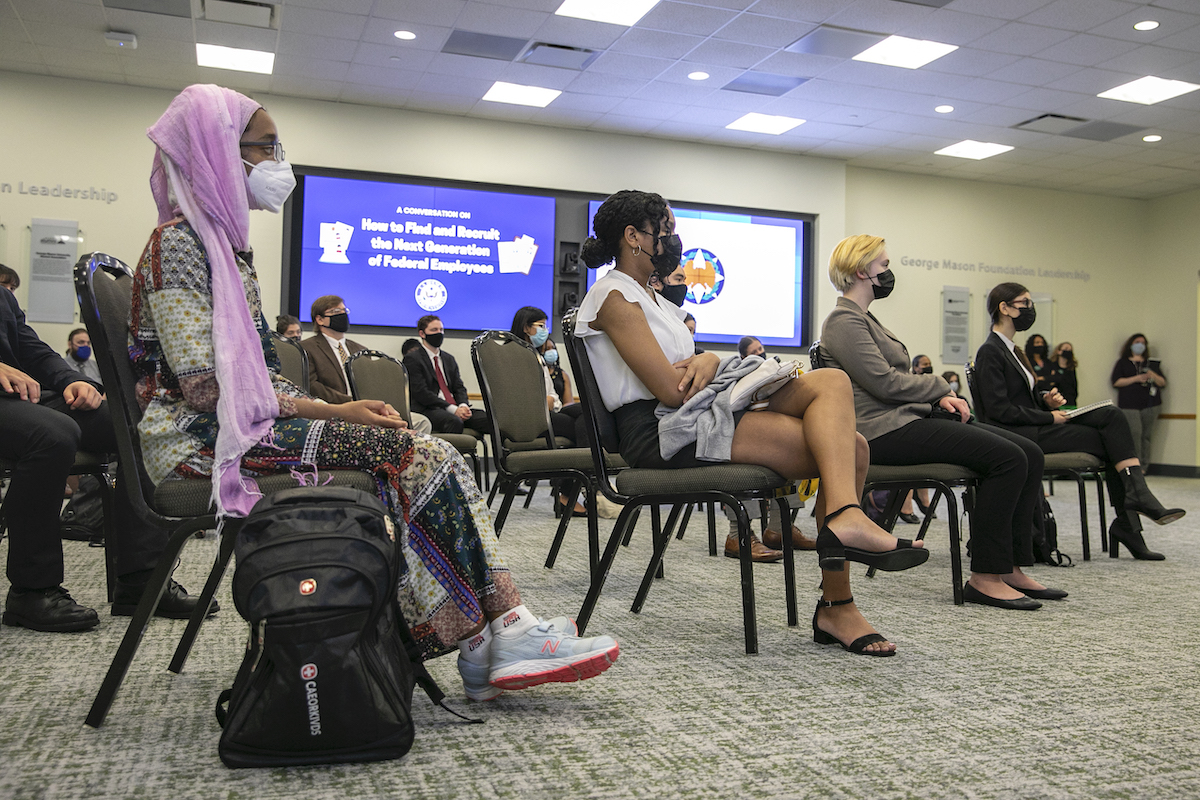George Mason University issued the following announcement on Oct. 7
With one-third of the federal workforce eligible for retirement, now is an opportune time for college students to consider pursuing internships and careers in the federal government, Kiran Ahuja, the director of the U.S. Office of Personnel Management (OPM), said Monday in a visit to George Mason University.
“This is actually the moment to come into the federal government,” Ahuja told a group of 50 students in Merten Hall. “We need more of you and your colleagues coming into the federal government, and we need a diversity of experience, and that includes… those early in their careers.”
U.S. Rep. Gerry Connolly (D-Va.), chair of the Subcommittee on Government Operations within the House Committee on Oversight and Reform, hosted the panel discussion: “A Conversation on How to Find and Recruit the Next Generation of Federal Employees.”
Connolly, whose 11th District includes Mason, said he is working with OPM on legislation to create more opportunities in the federal internship program to develop future public servants. Government officials also are working to streamline the hiring process.
Connolly noted that 8% of the 2.1 million federal workers are under the age of 30 while 29% are over 55.
“We’re not attracting the young talent we need to be attracting, and we are facing a huge bulge in retirement that has to be replaced,” Connolly said. “There’s a huge opportunity to do this right.”
Mason President Gregory Washington introduced the panelists, who also included Rep. Don Beyer (D-Va.). Ahuja and the congressmen noted the advantages of working for the federal government, the country’s largest employer: pay equality and step raises, built-in advancement opportunities, generous health benefits and savings plans, diverse workplaces, flexible telework options, paid parental leave and student loan forgiveness.
While there is a particular demand in science, technology, engineering and mathematics (STEM) fields, Ahuja emphasized that there are opportunities across disciplines. The panelists agreed that the best intern candidates have strong leadership, communication and writing skills, and a knack for solving problems.
“When I’m talking to leadership in these agencies, they need more economists, they need more project managers, they need more folks focused on policy,” said Ahuja, who was nominated by President Joe Biden and confirmed by the Senate in June. “It is literally every conceivable occupation.”
Ahuja encouraged students to visit www.usa.jobs and from there search for opportunities in the Pathways Program or look into the Presidential Management Fellowship Program. She added that working in the federal government can provide opportunities to bring about positive change in ways that might be more difficult working outside the system.
“Sometimes you’re better able to drive change from inside government than outside because you know how the system works and how laws are made and how regulations are put together,” said Ahuja, who started her career as an attorney at the Department of Justice and later spent six years as President Barack Obama’s executive director of the White House Initiative on Asian Americans and Pacific Islanders.
Mason graduate student Raima Roy, pursuing a master’s of public administration, asked Ahuja about OPM internships during the question-and-answer session. In her reply, Ahuja invited Roy to chat after the event.
“I really look up to Director Ahuja,” said Roy, noting both she and Ahuja are Indian American. “I’ve followed her career for a really long time. It’s amazing that I was just reading about her the other day and then the next day I get to see her in person. I’m thankful to Mason for that.”
Matt Myers, assistant director of industry advising in Mason’s University Career Services, said there is keen interest from students about internships and careers in public service. He said a government-focused week of Mason activities last month drew 650 students to nine events.
“We know that’s why a lot of students come here, especially our out-of-state students, to be able to have that access,” Myers said. “When they’re able to hear it from elected representatives and executives in the federal government, it helps to crystallize it a little bit more.”
Original source can be found here.

Source: George Mason University


 Alerts Sign-up
Alerts Sign-up